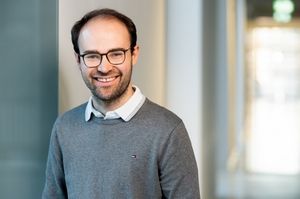Aktuelles
International renowned dissertation award for TUM Graduate School Alumni
Aktuelles |
The Dimitris N. Chorafas Foundation yearly awards outstanding young doctoral researchers from top-ranking universities worldwide in selected fields in engineering, medicine and the natural sciences with the Dimitris N. Chorafas Prize. The prestigious prize rewards research characterized by its high potential for practical application and by the special significance attached to its aftermath. Each year, the Technical University of Munich (TUM) may nominate two exceptional doctoral graduates for the Prize.

Dr. phil. Caroline Andonian-Dierks, MSc., Mag. pth. is awarded with the Dimitris N. Chorafas Prize 2023 for her thesis “Quality of Life and Psychosocial Outcomes in Adults with Congenital Heart Disease.”
Caroline Andonian-Dierks obtained two Master’s degrees in Psychotherapy Science at the Sigmund Freud University Vienna and in Health Science at the Technical University of Munich (TUM). She then pursued her doctoral research in the area of psychocardiology at the German Heart Center Munich and the TUM Department of Sport and Health Sciences, under the supervision of Prof. Dr. Jürgen Beckmann and the mentorship of Prof. Dr. Renate Oberhoffer-Fritz with highest honors. She is currently finishing her training as a cognitive behavioral therapist implementing her theoretical know-how and research results into her own clinical practice in Munich.
In her outstanding dissertation “Quality of Life and Psychosocial Outcomes in Adults with Congenital Heart Disease”, she has made remarkable contributions to pioneer in the largely unexplored field of psychocardiology for patients suffering from congenital heart disease. She gathered data from over 4,000 patients in a pursuit to understand the emotional cost of chronic illness and long-term surveillance. She identified novel prognostic markers of emotional suffering which will become increasingly important in future clinical management of multiple other chronic conditions. With over 27 international publications over the past four years, her research is highly respected within the international scientific community. As a lead scientist and psychotherapist, her goal is to make psychological care an integral part of a holistic, collaborative treatment approach tailored to the unique needs and experiences of patients suffering from chronic conditions. In the future, she could not think of a more rewarding career than one designed solely to decrease suffering and improve quality of life in the face of a chronic illness.

Dr. rer. nat. Philip Stanley, M.Sc., MBA is awarded with the Dimitris N. Chorafas Prize 2023 for his thesis “Solar Fuel Production with Metal-Organic Framework and Molecular Catalyst Assemblies.”
Philip Stanley obtained his Bachelor's and Master's degrees in chemistry at TUM. After a fellowship in venture capital for investments in advanced materials and completing an MBA, he pursued his doctoral research at the TUM in the area of artificial photosynthesis using inorganic materials’ chemistry. He conducted his research at the Chair of Inorganic and Metalorganic Chemistry, TUM School of Natural Sciences, under the supervision of Prof. Dr. Roland A. Fischer and the Wacker-Chair of Macromolecular Chemistry, TUM School of Natural Sciences, under the guidance of Prof. Dr. Bernhard Rieger. He received his doctoral degree in 2023 with summa cum laude.
In his outstanding doctoral thesis "Solar Fuel Production with Metal-Organic Framework and Molecular Catalyst Assemblies" he studied the efficient chemical conversion of solar energy to fuels. He achieved this by reducing carbon dioxide and oxidizing water simultaneously in one artificial material - thereby mimicking the working principles of natural photosynthesis to a certain extent. His thesis was not only able to show the viability of this approach with synthetic materials but was also able to increase the light harvesting efficiency to previously unreported values for this material class. With eight first-author publications in internationally respected and peer-reviewed journals within a short period of three years, he has made a highly relevant contribution to the field of sustainable energy harvesting and conversion. As a next step, research in this area will explore pushing the limits of these lab-scale materials towards sustainable industrial chemical processes.